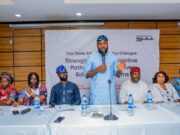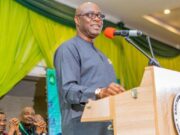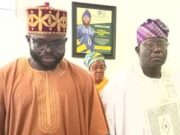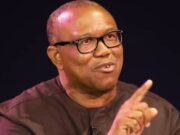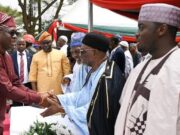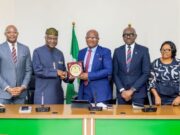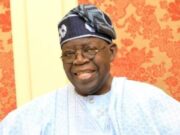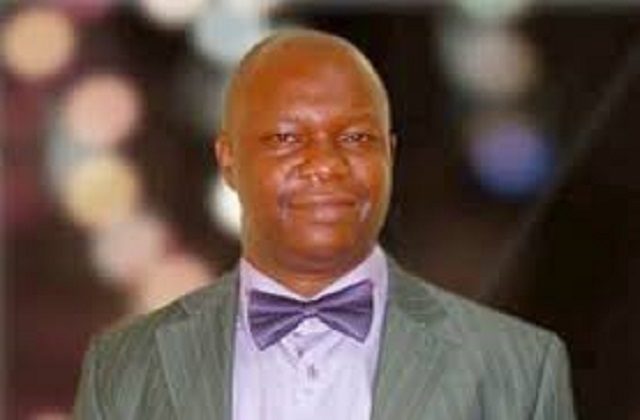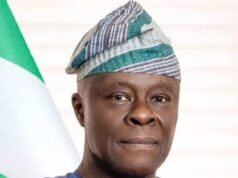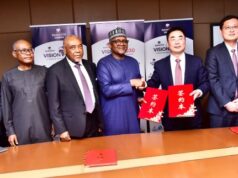In 1953, Honourable Member, Western House of Assembly, Samuel Ladoke Akintola, left a word for today. “I can understand the heaven of acceptance and the hell of rejection. I cannot conceive of a purgatory between acceptance and rejection,” he had told his fellow parliamentarians of the opposition bloc, the National Council for Nigeria and the Cameroons (NCNC).
It was in the thick of a tempestuous debate on a motion on the floor of the House. The motion was on introduction of Education and Health Levy for taxable adults in Western Nigeria. The debate was charged. Emotions were high. The man, who was to later become Premier of the region, in an address in support of the motion, said he knew that the opposition would see their impending loss as a stupendous setback.
The Obafemi Awolowo government needed this motion to sail through so as to push its agenda of education for all to the children of the poor. Opposition NCNC knew the motion’s social and political implications. It was a bullet aimed for its spine. It would deify the Action Group (AG) and carve a space for its leaders in the heart of the people. The urgent need to crush the egg and its potentially troublous foetus was indisguisable.
Bards aligned to the two political parties in the region went on assignment to push the importance of the motion to the people. Hubert Ogunde, singing about Awolowo, who he christened Ajagunmale, highlighted how the tax of 10 shillings per head would transform the west. NCNCer to the core, Ilorin, Dadakuwada singer, Odolaye Aremu, was to later seek to paint the bill as mundane. “E je ka ra ledi, ka si ka’we, iwe ti won o ka tele tele lati kekere o!” he mocked the AG. In an ad-lib, fast-tempoed poetry rendered in danceable rhythm, he seemed to say that the motion was for an emergency, irrelevant education policy.
In his defence of the motion, MP Akintola dropped the nugget that caught my attention today. He was livid with the opposition. He particularly singled out the Leader of Opposition in the parliament for his ambivalence to the motion which he said “aims at the creation of equal opportunity because those who have no money to pay can, as much as those who have, send their children to school”. Akintola then subtly attacked the petrel of Western region politics, Adelabu Adegoke, for what he perceived as his disputatious personality. Adegoke had earlier boasted that he was “humbler than Shaw, older than Jesus, more educated than Shakespeare, more worldly-wise than Socrates and better tailored than Lincoln.”
On Saturday, the last of the 2023 general elections was held. It was the governorship and House of Assembly elections. By now, following the trickle of results, winners are beginning to emerge and losers getting struck by damming reality. It is at this point that Akintola’s counsel becomes very valuable. Nigerian politics is a zero-sum game which hardly gives room or allowance for losers. When you lose, you lose fatally and when you win, the situation of both parties can be compared to the songs of those Israelite women who sang to taunt Saul and laud David. They chorused round the streets of Israel: “Saul has slain his thousands, and David his tens of thousands.” What awaits both winners and losers of these elections, in the words of Akintola, is “the heaven of acceptance and the hell of rejection” and there is no middle-of-the-way, what the polyglot labeled as the nil “purgatory between acceptance and rejection”.
Ebenezer Obey’s famous ese girigiri nile anjofe – the myriad feet that walk towards freebies – will cease in the homes of the losers. Contrarily, the winners will continue to play host to heavy traffic of feet. It is the nature of Nigerian politics.
The election cycles in Nigeria have a lot to contribute to social perception, our knowledge of our fellow human beings and the nature of contests in our society in general. For those who believe that Nigeria is irredeemable, some of such negative baptisms come from encounters with fellow politicians and electors. This is responsible for the coinage of that queer theory that there is no morality in politics. Which totally negates what political science theory teaches. Harold Laski, in his groundbreaking Substance of politics tells us that morality is a core fabric of politics and indeed, it is what politics ought to drive politics.
Betrayal, dog eat dog, hatred and witch-hunting are the posters of Nigerian politics. As it is scarce to find a white fox, so is it to find a man of integrity among politicians. It is a survival of the fittest and elimination of the weakest.
For those who lost their deposits in the just concluded elections, it is time to recount bitter experiences. Daggers are thrust at one another at moments friends lean on friends and associates lay their hopes on the other. The experiences, many times unpalatable, can be summarized in one of Tatalo Alamu’s songs. This Ibadan native folksong bard is today kept alive in the pseudonym of one of Nigeria’s famous columnists whose engaging Sunday weekly column is a must-read. Elections cause dissonance in friend, family and group relations. Tatalo, in this particular track that came to my mind, lamented that the world had gone upside down, so much that the son could not hear the father; twins are at daggers drawn and, b’omo pepeye nbo wa o, iya re a gb’eyin yo – even the duck and its chicks are in mutual antagonism.
Elections in Nigeria are war by other means. Many people have spoken to the high stakes involved as cause of their volatility. The cost of running for elective offices in Nigeria is massive and mind-boggling. Winning elections is however a gold dig for winners. Losers just hold on to the end of the stick, drained and most times left to sulk and lament their losses. Winners, though momentarily drained of funds, look forward to office as the spoils of war, an avenue to recoup their investments. The high stakes of elections in Nigeria make us to witness, at each election cycle, apathy of the qualified and such, traffic of charlatans with money into the electoral process, as well as a desperation that borders on the deadly.
The zero-sum game of politics is also responsible for the violence, killing and baffling corruption that go into the electioneering process. There is no doubt that Nigeria is blessed with abundance of talented human resources, such that, if we get these ones to participate in our electoral process, the change we seek will come bountifully from their ideas. There is also huge wisdom in the famous quip that if good men refrain from participating in politics, they give room for mediocres to reign. However, the unpleasant encounters of these “good ones” in politics are a pushback in achieving their participation in politics. What the “good ones” encounter in Nigerian politics is comparable to another narrative offered by Tatalo in that same vinyl I referenced above.
The yearly Oro festival is announced in villages, A o s’oro, omo oko, e wa’le odun o, urging sons and daughters to leave for the town where Oro is celebrated with pomp and ceremony. However, the one who first heeds the call by entering the town at midnight is the one who is slaughtered in ritual appeasement of the Oro cult. This teaches others the wisdom of abstention. So many bright brains and minds who leave their foreign lands of sojourn or who resign from their engagements to participate in the politics of their localities would be lucky if they return alive to their domiciles, or if they return with their minds and sanity intact after election.
In spite of the murky waters of Nigerian politics, many have braved all its odds, participated in politics and overcame all its divisiveness. In fact, by now, we know that the salvation of Nigeria lies in democratic politics, with its magic of elections. Gone are the days when we relied on khaki men as holding hope for us; when gunmen in military uniforms fired themselves into Government Houses pretending to be our Messiah.
Many scholars have held that, not minding the huge hues and cries at what goes on at the federal level, we should actually concentrate our energy on the states. The states are the head from where Nigeria gets rotten. There are a lot of changes that can come our way from a development-oriented locality administration. While the 1999 Constitution is accused of concentrating powers disfavourably to the federal government, it in the same vein recognizes and carves out enormous powers for the states and local governments. One of such bequeathals is the sole powers of the states in land administration. It is why, if you want to feel the barometer of Nigeria’s development in the next four years, check the trickling votes and where the pendulum of yesterday’s election is tilting.
Who did we vote in to administer Nigeria in the states and what is the texture of the emerging Honourable members-elect? You do not need an Ouija-board to predict what will happen in the states. If the results are pointing at the retention of the status-quo, with known reactionaries at the helm of affairs of the states and rubber stamp zombies as House of Assembly members-elect, then you can predictably tell where we are headed. In some other states however where retention of the status-quo is imminent, because of the persons’ performances in the first half, some glimmer of hope may be seen in the horizon.
I, however, have words of admonition for, especially greenhorns who are coasting home to victory in yesterday’s election. First is that, four years may look like an eternity but it flies faster than the whoosh of the wind. What this should tell you is that, you must, as Wole Soyinka counsels, set forth at dawn. If the aphorism is that time waits for no man, in political office, your Number One enemy is time as it conspires against you. In being aware of how precious time is, you must combat the evil called procrastination. I remember that kindergarten rhyme, tick says the clock, tick, tick, what you have to do, do quick. Your time does not start from when you are sworn in, it begins now. Before you know it, your time is up.
Second is, Your Excellency and Honourable-to-be, are you aware of three men named Obafemi Awolowo, Ahmadu Bello and Nnamdi Azikiwe? Have you asked yourselves why these men have refused to die, despite their deaths? They spent slightly more years than you have to spend in office but their immortality was procured on account of their leadership labour for their people. You can get the same immortality if you commit yourself to the people.
Third, never help fellow politicians reify that nonsensical Nigerian political shibboleth that there is no morality is politics. Every day you spend in office, spend it as if it is your last and when you sleep at night, ask yourself how many people’s lives you have changed for that day. It quickens the pace of your immortality.
Fourth, the people may look very unappreciative and insatiable but, you must work for their tomorrow. Make John Stuart Mills and the utilitarian school your biggest companion. For anyone in power, this school advocates that an action or policy is right if it results in the happiness of the greatest number of people in society. The greatest good of the greatest number should be the benchmark of every policy of your government. How many people are able to be rescued from the poverty headcount by this policy just taken? That should be your daily refrain if you want to attain immortality in the minds of the people, Your Excellency.
Finally, Your Excellency, don’t allow the glitter of office and how people will make a deity of you to make you assume that you are superhuman. You are as expendable, perishable and finite as the man next door. Your excrement smells like every other person’s. God forbid, if you drop dead today, like every other man, horrible smell emitting from your body and the maggots that will take over will be like those of the vagabond on the street. This realization should bring a feeling of sobriety and desire to serve your fellow man in you. I wish you good luck.
Popular columnist, Dr Festus Adedayo sent this in from Ibadan, the capital city of Oyo State







